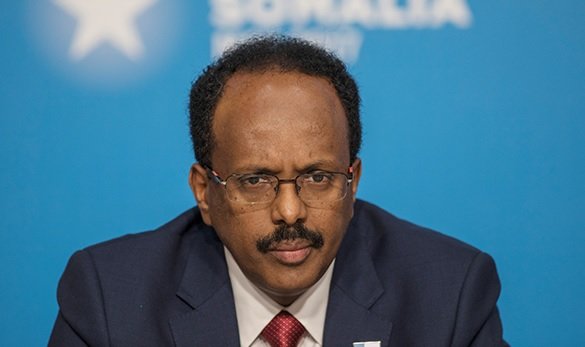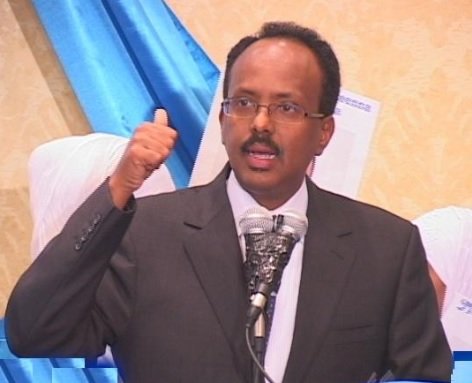By Faisal A. Roble
In his lame-duck year, Farmajo is on the cusp of plunging Somalia into a renewed conflict. Thanks to what I call the “Farmajo Doctrine,” we may see more devastating and bloodier conflicts in the ensuing months.

As of today, there is a low-intensity conflict between Somaliland and Puntland. These two regions are the most stable regions in the country. However, since Farmajo took office, instability is a new addition to their hitherto limited worries.
In Galmudug, he muzzled out an administration in his image and declared an unexpected war on the Ahlusuna Sufi group. As a matter of fact, he ambushed them while the two sides were in talks and had attacked them by a surprise; consequently, he succeeded to overrun them by using undisciplined and what appears to be former gangs, mainly from the Al-Shabab-occupied Southwest region. These armed boys, who have shown a proclivity for looting and unbecoming languages, seem to have no supervision while conducting life-and-death operations.
What we have seen in the videos remind us of a throwback to the “Hungesh” and tribalized militia days of the 1980s in Hargeisa. People in Hargeisa were vilified by untrained militia from the government troops and victory bearers militia (Guul-Wadayaal), whose sole purpose was to terrorize and intimidate the residents of the region.
There is also a dangerous war that has officially flared up in the Gedo region of Jubbaland. Beled-Hawo, a border town between Kenya, Ethiopia, and Somalia, is the latest battlefield in the most southern state of Somalia. The opening of a major conflict in this theater is very dangerous and may succumb Jubbaland Region into a 1990s-type conflict.
More worrisome is a rare terrorist act that took place in Laascaanood on the eve of March 2, 2020. An armed terrorist targeted Sool’s provincial court chairman, and killed him in Laascanood, after an explosive device attached to his vehicle went off. This is unprecedented in both Somaliland and Puntland.
All these new disarticulations and the undoing of Somalia in 2020 can only be explained within the framework of the “Farmajo Doctrine.,” to which the US government and the United Nations remained oblivious for too long.
The “Farmajo Doctrine” says this: “Might is Right!” And with this doctrine, Turkey, Qatar, Ethiopia and, to a certain extent, the US and the United Nations offices assume the blame in that they enabled and financed the sliding back of Somalia as a result of the “Farmajo Doctrine.
This doctrine is advised by two intertwined experiences that Farmajo had both as a youngster and as a politician. The first one is his belief in a superficial nationalism born out of the Barre experience. Some of the elements of this experience include the belief that he is more in tune with creating a strong and unitary government for Somalia.
As a young technocrat growing up under the shadow of Barre, he was influenced by the history of that era and that Barre had established the best Somalis government ever. He, therefore, maintains the belief that Barre was right and those who fought against him were reactionaries. A close friend of his told me that Farmajo sees himself as a “Dervish without the Poetry” who will revive the Somali state.
His second and more important source for his doctrine is the humiliation he had suffered during the Kampala accord (June 2011). He believes he was robbed of his prime minister position.
Accordingly, he had never forgiven those elites that mistreated him, including former President Sheikh Sharif and his replacement, Dr. Abdiweli Gas. Farmajo wants to make sure that history never repeats itself and wants to make sure that he uses force whenever political opposition is mounted against him. He did so inside Mogadishu against opposition groups, in Jubbaland, in Puntland, and more devastatingly in Southwest and Galmudug.
In Mussolini’s fascism case, the source for inspiration was an element of religiosity against individualism. In the case of Hitler’s case, it was a purported personal humiliation that he had suffered after he returned from World War I.
Farmajo’s doctrine, rooted in his belief of Somalia’s elite wronging or mistreating Said Barre and his own humiliation in the hands of contemporary politicians, will certainly employ the toolbox of “Might is Right,” even if he has to succumb Somalia to the quagmire.
The “Farmajo Doctrine” is already in full gear and Somali regions are either in war with the federal government, amongst themselves, or with terror groups. And that is not what Somalis expected to see in 2020.
Faisal A. Roble
Email: faisalroble19@gmail.com
———–
Faisal Roble, a writer, political analyst and a former Editor-in-Chief of WardheerNews, is mainly interested in the Horn of Africa region. He is currently the Principal Planner for the City of Los Angeles in charge of Master Planning, Economic Development and Project Implementation Division


Leave a Reply